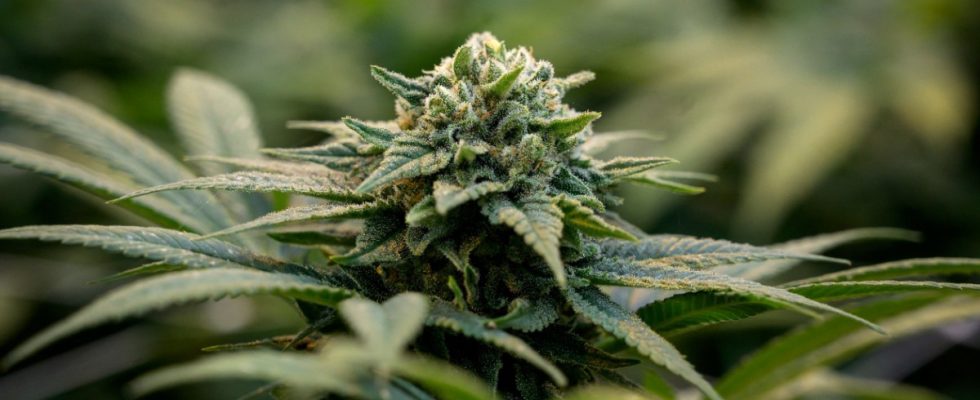After much back and forth, the Bundestag passed a law this Friday that will enable the legal consumption of cannabis from April 1st. But there are still rules – and not too few. An overview.
What exactly will be allowed in the future?
In principle, only adults are allowed to consume cannabis; cannabis remains prohibited for children and young people without exception. Anyone of legal age is allowed to possess up to 50 grams of cannabis for private consumption and store it in their home. The cultivation of a maximum of three plants is permitted there. If the plants produce more crops, anything that exceeds 50 grams must be destroyed immediately. A maximum of 25 grams may be carried in public spaces. And: Cannabis may only be purchased and stored for personal consumption and may not be passed on, not even to adults.
Can it be consumed anywhere?
No. Cannabis may not be consumed at all in the “immediate presence” of children and young people. The use of the drug is also prohibited in playgrounds, schools, daycare centers, youth facilities and sports facilities – as well as within a hundred meters of visibility around all of these facilities. There is a ban in pedestrian zones between 7 a.m. and 8 p.m. Drug consumption is prohibited around the clock in military areas of the Bundeswehr.
Where can you buy cannabis legally?
This is where things get complicated. The law basically provides two ways to get cannabis: Either you grow it yourself at home. Or you become a member of a so-called “social club”. Such grower associations will probably emerge nationwide in the coming months. Each of these clubs can accommodate a maximum of 500 members, who must be resident in Germany. Cultivation can be done communally in the clubs. Cannabis can then be distributed to each member, a maximum of 50 grams per month and no more than 25 grams per day. For reference: You can make around 75 joints from 25 grams. A special regulation applies to young adults between 18 and 21 years of age – provided they are a club member, they are entitled to a maximum of 30 grams per month, with a maximum THC content of ten percent. THC, i.e. tetrahydrocannabinol, is the intoxicating active ingredient. Cannabis clubs are not allowed to advertise; warehouses and cultivation areas must be secured.
How do you pay?
To purchase cannabis from a social club, you must collect it in person on site and present your membership card and ID card. Postal delivery is excluded. Only cannabis in its pure form can be purchased, not mixtures with tobacco or food.
This means: pre-rolled joints are not available, and neither are hash cookies. The weight, variety and THC content must also be noted on an enclosed information sheet, as well as information about health risks. But: A purchase price may not be demanded. The cultivation clubs are supposed to be financed through membership fees. Smoking weed could be disproportionately expensive, especially for occasional users, if they pay the same membership fee as people who make the most of their 50 grams month after month.
What does the new law mean for road traffic?
The Federal Ministry of Transport is still working on a regulation for a THC limit when driving – comparable to the per mille limit that applies to alcohol. One of the complications is that THC can be detected in the blood for a relatively long time, even after the intoxicating effect has long since worn off. There should be a solution by March 31st.
Is it certain that legalization will come into force on April 1st?
Not quite. In principle, the law does not require approval from the Federal Council. However, the state chamber can still appeal to the mediation committee. This could not stop legalization, but at least delay it. CSU-led Bavaria has already announced that it will submit a corresponding application. The Union states are hoping for a majority of votes in the Federal Council, especially since many Social Democrats are also critical of the law. The state interior ministers, among others, have spoken out unanimously against it – including those from the SPD. The SPD parliamentary group in the Bundestag also did not want to unanimously agree to the law.
Is this the end of legalization?
According to the official plans of the traffic light government, the law that is now coming into force is only a first step. In a second phase, model regions will be defined in which cannabis will be sold freely in licensed shops. However, the legislative process for phase one was already turbulent – at times the majority in the coalition seemed to be wobbling. In addition, after a brief phase as a fan of legalization, Federal Health Minister Karl Lauterbach (SPD) has now returned to a rather rigid stance. It is at least questionable whether phase two will actually begin during this legislative period.
Is there a retroactive amnesty?
Anyone who has already been prosecuted for an offense that will no longer be punishable in the future can submit an application and have the entry deleted from their file. In principle, a retroactive amnesty would also be possible if someone is currently serving a prison sentence. However, you usually don’t have to go to prison for pure consumer offenses. It is conceivable, however, that prisoners who have been convicted of multiple offenses can apply to have their sentence reduced.

